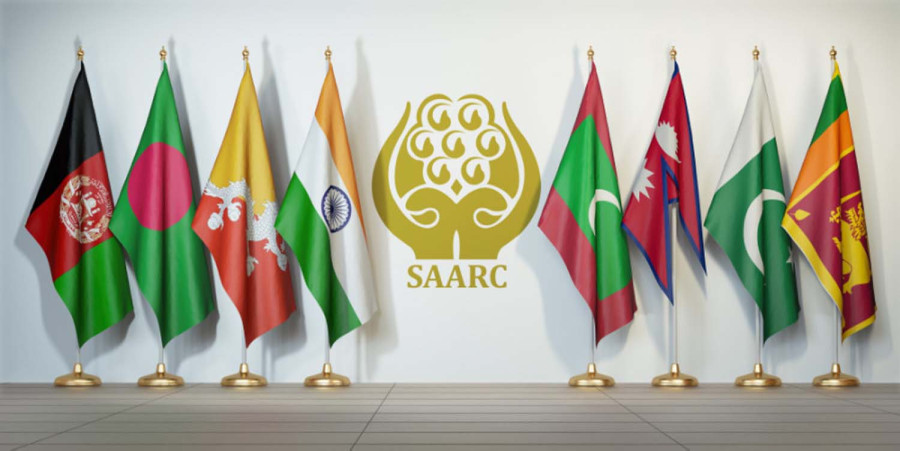National
Skipped UNGA sidelines meeting another nail in the Saarc coffin
Experts cite India-Pakistan rivalry and Kabul confusion as key reasons for the regional body’s sorry state.
Anil Giri
The annual meeting of Saarc foreign ministers on the sidelines of the United Nations General Assembly in New York used to be a key aspect of the Saarc process.
The meeting usually set the tone of the regional bloc by informally discussing various issues to sort them out amicably.
But officials say, this year, just like last year, there will be no meeting of Saarc foreign ministers on the sidelines of the 77th session of the United General Assembly that kicked off in New York last week.
According to the Ministry of Foreign Affairs, Foreign Secretary Bharat Raj Poudyal has already left for New York leading the Nepali delegation. But the statement is mum on the ministerial meeting.
The meeting could not happen last year owing to the regime change in Afghanistan following the Taliban’s takeover of the country.
Foreign policy experts reckon the stalled Saarc process, long a victim of India-Pakistan rivalry, has landed in fresh trouble after new developments in Kabul.
Afghanistan had joined the regional bloc in 2007 to become its eighth member.
“The situation is getting more complicated by the day,” said Arjun Bahadur Thapa, former general secretary of Saarc.
The foreign minister of the chair country convenes the meeting of the Saarc Council of Ministers. Nepal is the longest serving chair of the Saarc and has been heading the regional organisation for the past eight years.
But Foreign Minister Narayan Khadka is not traveling to New York and there is also no plan to hold a virtual meeting.
Former foreign secretary and Nepal’s permanent representative to the United Nations Madhu Raman Acharya said the foreign secretary can also participate in the sidelines meeting; former secretaries used to lead the Nepali delegation at the Saarc meeting in New York.
“There would be no problem in the foreign secretary representing the country at the foreign ministerial meeting. If that is not possible, the foreign minister can chair the meeting virtually, as the New York meeting is an informal one,” added Acharya.
As the meeting is informal, member states can also send their permanent representatives to the UN, if the foreign ministers are not available.
Established in 1985, Saarc is in a moribund state. It has not been able to hold its 19th summit since it was called off in November 2016 following India’s refusal to participate. As per the Saarc charter, if a member state refuses to participate, the summit cannot be held. Nepal became Saarc chair after it hosted the 18th summit in Kathmandu. In 2020, owing to the Covid pandemic, the Saarc meeting of foreign ministers in New York was held virtually.
This time, Nepal, as Saarc chair, could have sent out invitations to the member states if it wanted to conduct an in-person meeting so as to make a push for moving the Saarc process forward.
“But with the November elections just two months away and the Kabul confusion persisting, Foreign Minister Khakda has decided not to travel to New York,” a foreign ministry official told the Post.
Nepal and other Saarc members have remained neutral on the regime change in Afghanistan.
Saarc members will face a new dilemma in March next year after Esala Ruwan Weerakoon will complete his three years term as Saarc secretary-general and as per Saarc tradition, someone from Afghanistan should assume the post.
“In the past eight years, there has been no Saarc summit, after the Kathmandu summit in 2014. So the future of the regional grouping looks bleak as relations between India and Pakistan have not improved and the Kabul confusion remains,” said Thapa.
Some experts are of the view that India is the main obstacle to the Saarc process as it has, in recent years, been touting another grouping, the Bay of Bengal Initiative for Multi-Sectoral Technical and Economic Cooperation (Bimstec), as an alternative to Saarc. Clearly, India wants to exclude Pakistan from regional bodies.
“Saarc member states are still unclear about the Afghan situation; our foreign minister is busy with domestic issues including the elections; and India is visibly disinterested in the Saarc process—all these things suggest Saarc is a goner,” another foreign ministry official said, requesting anonymity.
Some Indian experts believe the longstanding chill in relations between India and Pakistan is the main factor stalling the Saarc process.
Nihar Nayak, a strategic analyst with the Manohar Parrikar Institute for Defence Studies and Analyses in New Delhi, said although members cannot raise bilateral issues at Saarc meetings, such issues have traditionally had deep impact on the Saarc.
“The Saarc process can move ahead only if India-Pakistan relations improve,” Nayak said. “But I see no such possibility in the near future as the prime ministers of the two countries did not even meet on the sidelines of the recent Shanghai Cooperation Organisation (SCO) in Uzbekistan.”




 14.12°C Kathmandu
14.12°C Kathmandu














